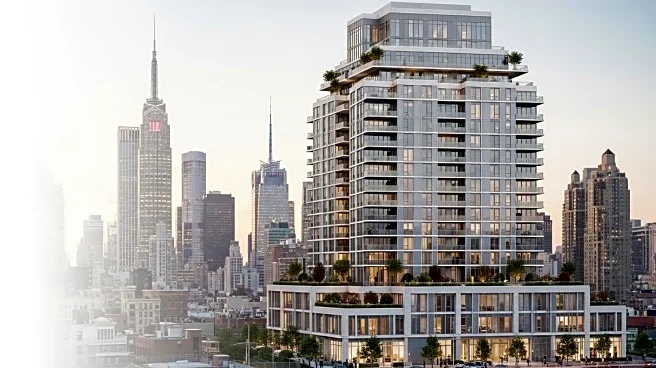What's Happening?
In New York City, a trend is emerging among young, affluent homebuyers who are increasingly opting for single-floor condos over traditional multi-story townhouses. Real estate brokers report that these buyers, often newly wealthy from industries like finance and technology, are drawn to the convenience and luxury of sprawling condos that offer a 'full floor' experience. This preference is contributing to a decline in the average sale price of Manhattan townhouses, which fell by 18% to $6.3 million in the first half of 2025 compared to the previous year. The trend is particularly noticeable in areas like the West Village, where new condo developments are setting high price records, while townhouse sales have stagnated.
Why It's Important?
This shift in housing preferences among the wealthy has significant implications for the New York City real estate market. The demand for condos over townhouses could lead to changes in property values and development trends, as builders and investors may focus more on constructing luxury condos to meet this demand. The decline in townhouse prices could affect long-term property investments and the market dynamics in traditionally townhouse-heavy neighborhoods. Additionally, the preference for condos reflects broader lifestyle changes among the affluent, who prioritize convenience and modern amenities over the traditional appeal of townhouses.
What's Next?
As the trend continues, real estate developers may increasingly focus on building high-end condos to cater to the preferences of young, wealthy buyers. This could lead to a transformation in the architectural landscape of neighborhoods known for their historic townhouses. Real estate agents and brokers might also adjust their strategies to better market condos to this demographic. Additionally, the ongoing demand for luxury condos could drive up prices in this segment, potentially widening the gap between different types of housing in the city.
Beyond the Headlines
The preference for condos over townhouses among the wealthy may also reflect broader cultural shifts, such as a move towards urban living that emphasizes convenience and modernity. This trend could influence urban planning and zoning policies, as cities adapt to the changing needs and preferences of their residents. Furthermore, the decline in townhouse popularity might impact the preservation of historic neighborhoods, as the demand for modern living spaces grows.









